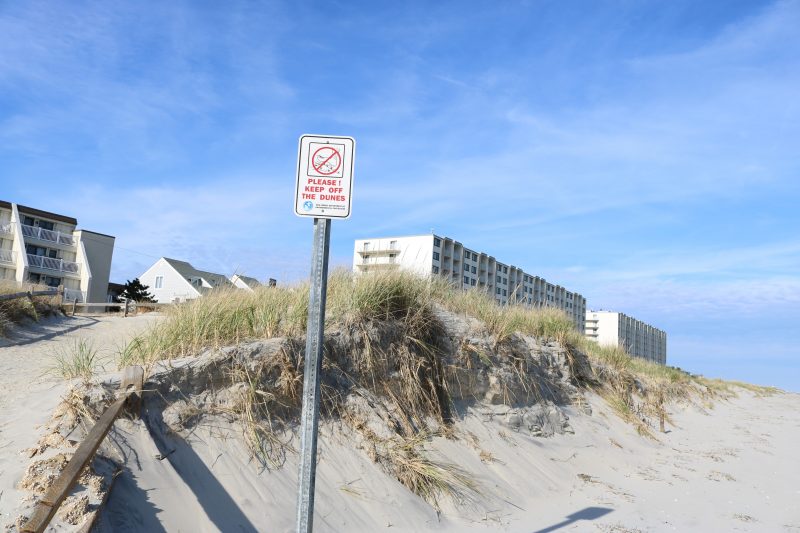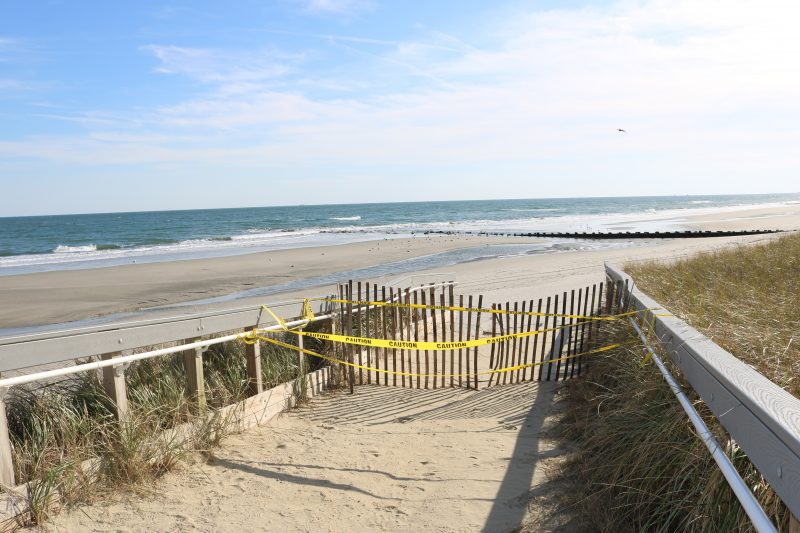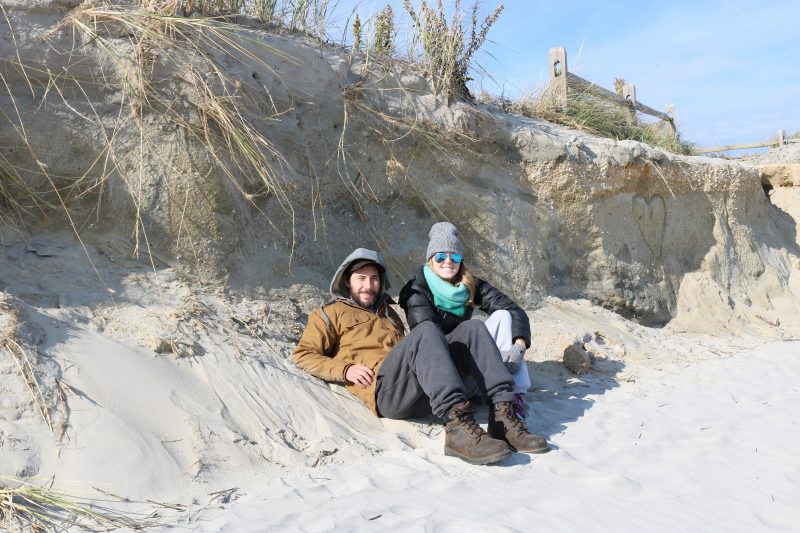Some pathways to the beach are blocked off to prevent people from venturing out where there are steep drop-offs in the storm-damaged dunes.
 By DONALD WITTKOWSKI
They didn’t draw straws or pick numbers from a hat, but Sea Isle City will be last in line among three neighboring shore towns that will have their eroded beaches replenished with more than 2 million cubic yards of fresh sand.
The dredging company hired by the U.S. Army Corps of Engineers for the beach restoration project will do the work in Strathmere first, followed by Ocean City and then Sea Isle, according to the schedule.
It won’t be until about mid-April that the contractor, Great Lakes Dredge & Dock Co., shows up in Sea Isle to begin replenishing the beaches in two parts of town, City Business Administrator George Savastano said.
In giving an update on the project, Savastano said during Sea Isle’s City Council meeting Tuesday that the work should be done my mid-June. The race will be on to complete the project before the peak summer tourism season is fully underway and Sea Isle’s beaches are crowded with tens of thousands of vacationers.
Incentives are included in the contract to reward Great Lakes for quickly completing the work.
“The quicker they get done, the more money they make. There’s no incentive to go slow,” Savastano said in an interview after the Council meeting.
Strathmere’s beaches are expected to be replenished by the end of December or early January. Work will then turn to the southern end of Ocean City, with the restoration of the beaches and dunes from 45th Street to Corson’s Inlet State Park expected to take place in January and February.
Savastano said Strathmere and Ocean City are going ahead of Sea Isle because of the need to dredge sand from Corson’s Inlet before environmental restrictions take effect there between April and June. Savastano said he believes the environmental restrictions are related to fishing.
Ocean City’s north end beaches from Seaview Road to 12th Street will also be replenished. Work there is expected to begin in April or May. Sand for that part of the project will be dredged from the Great Egg Harbor Inlet.
For Sea Isle’s project, Great Lakes will anchor a ship about 2½ miles offshore to dredge sand from a “borrow area.” The sand will be pumped through pipes from the offshore dredge site to Sea Isle’s beaches.
Plans call for 510,000 cubic yards of sand to be deposited on the beaches from about 75th Street to 93rd Street in Townsends Inlet.
Another 250,000 cubic yards of sand will freshen up the beaches from around 28th Street to 53rd Street.
By DONALD WITTKOWSKI
They didn’t draw straws or pick numbers from a hat, but Sea Isle City will be last in line among three neighboring shore towns that will have their eroded beaches replenished with more than 2 million cubic yards of fresh sand.
The dredging company hired by the U.S. Army Corps of Engineers for the beach restoration project will do the work in Strathmere first, followed by Ocean City and then Sea Isle, according to the schedule.
It won’t be until about mid-April that the contractor, Great Lakes Dredge & Dock Co., shows up in Sea Isle to begin replenishing the beaches in two parts of town, City Business Administrator George Savastano said.
In giving an update on the project, Savastano said during Sea Isle’s City Council meeting Tuesday that the work should be done my mid-June. The race will be on to complete the project before the peak summer tourism season is fully underway and Sea Isle’s beaches are crowded with tens of thousands of vacationers.
Incentives are included in the contract to reward Great Lakes for quickly completing the work.
“The quicker they get done, the more money they make. There’s no incentive to go slow,” Savastano said in an interview after the Council meeting.
Strathmere’s beaches are expected to be replenished by the end of December or early January. Work will then turn to the southern end of Ocean City, with the restoration of the beaches and dunes from 45th Street to Corson’s Inlet State Park expected to take place in January and February.
Savastano said Strathmere and Ocean City are going ahead of Sea Isle because of the need to dredge sand from Corson’s Inlet before environmental restrictions take effect there between April and June. Savastano said he believes the environmental restrictions are related to fishing.
Ocean City’s north end beaches from Seaview Road to 12th Street will also be replenished. Work there is expected to begin in April or May. Sand for that part of the project will be dredged from the Great Egg Harbor Inlet.
For Sea Isle’s project, Great Lakes will anchor a ship about 2½ miles offshore to dredge sand from a “borrow area.” The sand will be pumped through pipes from the offshore dredge site to Sea Isle’s beaches.
Plans call for 510,000 cubic yards of sand to be deposited on the beaches from about 75th Street to 93rd Street in Townsends Inlet.
Another 250,000 cubic yards of sand will freshen up the beaches from around 28th Street to 53rd Street.
 Some pathways to the beach are blocked off to prevent people from venturing out where there are steep drop-offs in the storm-damaged dunes.
Savastano explained that about 20,000 cubic yards of sand per day will be pumped onto the beaches.
There will be pipes on the beaches in May and part of June during the work, but the contractor can close no more than 1,000 feet of shoreline at one time while the project is being done, Savastano said.
“Ideally, they’ll be done by mid-June,” he said of all of the work.
The Army Corps of Engineers has awarded a $32.5 million contract to Great Lakes for beach replenishment in Sea Isle, Ocean City and Strathmere. Altogether, 2.4 million cubic yards of new sand will restore the storm-damaged beaches in the three towns.
However, there are also options in the contract for additional sand. The options could be exercised depending on surveys and the condition of the beaches. The cost of the base contract and all of the contract options is $41.3 million.
Sea Isle, Ocean City and Strathmere suffered significant beach erosion in some spots during a lingering coastal storm that unleashed a series of unusually high tides over a four-day period in early October.
During the storm, huge chunks of sand were sliced away from the dunes, leaving cliff-like walls in some areas. Some beaches appeared bare – stripped of their powdery top layer of sand. Wooden dune fencing was torn to shreds.
Even before the October storm, beaches and dunes in Townsends Inlet between 88th and 92nd streets had suffered significant erosion. The sand dunes, in particular, have been sheared away by the churning surf, creating jagged cliffs more than 10 feet high.
Yellow caution tape and other barriers have been erected to prevent people from venturing out on beach pathways that have steep drop-offs.
Even more damage to the beaches and sand dunes is expected Sunday and possibly Monday from high winds and flooding generated by another nor’easter this weekend.
Most of the replenishment contract involves widening the beaches. However, in some areas, the dunes, beach access points and sand fencing will be repaired.
The project will be funded mostly by the Army Corps of Engineers and the New Jersey Department of Environmental Protection. The three towns will each kick in a smaller share. Savastano said Sea Isle’s contribution should be less than $2 million.
Some pathways to the beach are blocked off to prevent people from venturing out where there are steep drop-offs in the storm-damaged dunes.
Savastano explained that about 20,000 cubic yards of sand per day will be pumped onto the beaches.
There will be pipes on the beaches in May and part of June during the work, but the contractor can close no more than 1,000 feet of shoreline at one time while the project is being done, Savastano said.
“Ideally, they’ll be done by mid-June,” he said of all of the work.
The Army Corps of Engineers has awarded a $32.5 million contract to Great Lakes for beach replenishment in Sea Isle, Ocean City and Strathmere. Altogether, 2.4 million cubic yards of new sand will restore the storm-damaged beaches in the three towns.
However, there are also options in the contract for additional sand. The options could be exercised depending on surveys and the condition of the beaches. The cost of the base contract and all of the contract options is $41.3 million.
Sea Isle, Ocean City and Strathmere suffered significant beach erosion in some spots during a lingering coastal storm that unleashed a series of unusually high tides over a four-day period in early October.
During the storm, huge chunks of sand were sliced away from the dunes, leaving cliff-like walls in some areas. Some beaches appeared bare – stripped of their powdery top layer of sand. Wooden dune fencing was torn to shreds.
Even before the October storm, beaches and dunes in Townsends Inlet between 88th and 92nd streets had suffered significant erosion. The sand dunes, in particular, have been sheared away by the churning surf, creating jagged cliffs more than 10 feet high.
Yellow caution tape and other barriers have been erected to prevent people from venturing out on beach pathways that have steep drop-offs.
Even more damage to the beaches and sand dunes is expected Sunday and possibly Monday from high winds and flooding generated by another nor’easter this weekend.
Most of the replenishment contract involves widening the beaches. However, in some areas, the dunes, beach access points and sand fencing will be repaired.
The project will be funded mostly by the Army Corps of Engineers and the New Jersey Department of Environmental Protection. The three towns will each kick in a smaller share. Savastano said Sea Isle’s contribution should be less than $2 million.
 Steve and Tess Protesto, of Media, Pa., lounge on the sand at the base of the eroded dunes.
Steve and Tess Protesto, of Media, Pa., lounge on the sand at the base of the eroded dunes.